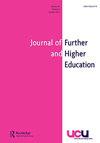2019冠状病毒病大流行期间,学生自我披露对高等教育工作者压力和福祉的影响
IF 2.4
Q1 EDUCATION & EDUCATIONAL RESEARCH
引用次数: 0
摘要
工作压力、职业倦怠和疲劳在高等教育工作者中很常见,而在全球大流行期间,教学面临的持续挑战使这些问题变得更加复杂。在努力识别和理解教育者压力的贡献者的过程中,学生与教师的互动受到的关注相对较少。然而,当学生透露学术和个人问题时,教育工作者往往被期望从事教牧关怀。接受和回应自我表露可能是情感上的负担,特别是在专业护理环境中,因此会导致教育者的压力和倦怠。在这项研究中,我们研究了新西兰COVID-19大流行期间学生自我披露与教育者压力和幸福感之间的关系。318名高等教育工作者中,几乎所有人都从学生那里收到了与COVID-19相关的信息。调查结果显示,在2019冠状病毒病期间,学生有共同个人问题的教育工作者更有可能报告压力大、幸福感差。这样的交流也与较高的职场出勤率有关,这表明这些老师可能会把自己逼到有患病风险的程度。幸运的是,当教育工作者也报告了工作场所的支持感时,这些负面影响得到了改善。讨论了对教育工作者和高等教育院校的影响,包括提供教育工作者培训和资源充足的学生支持服务。本文章由计算机程序翻译,如有差异,请以英文原文为准。
The impact of student self-disclosure on the stress and wellbeing of tertiary educators during the COVID-19 pandemic
ABSTRACT Workplace stress, burnout, and fatigue are commonplace amongst tertiary educators, and are compounded by the ongoing challenges of teaching and learning during a global pandemic. Amid efforts to identify and understand contributors to educator stress, student-teacher interactions have received relatively little attention. However, educators are often expected to engage in pastoral care when students disclose academic and personal problems. Receiving and responding to self-disclosure can be emotionally taxing, particularly in professional contexts of care, and therefore contribute to educator experiences of stress and burnout. In this study, we examined the relations between student self-disclosure and educator stress and wellbeing during the COVID-19 pandemic in New Zealand. Almost all of the 318 tertiary educators received COVID-19 related disclosures from students. Findings show that educators whose students had shared personal problems during COVID-19 were more likely to report high stress and poor wellbeing.Such communication was also associated with higher rates of workplace presenteeism, suggesting that these teachers were likely to push themselves to a level that risks illness. Fortunately, these negative impacts were ameliorated when educators also reported a sense of support in the workplace. The implications for educators and tertiary institutions are discussed, including the provision of educator training and well-resourced student support services.
求助全文
通过发布文献求助,成功后即可免费获取论文全文。
去求助
来源期刊

JOURNAL OF FURTHER AND HIGHER EDUCATION
EDUCATION & EDUCATIONAL RESEARCH-
CiteScore
5.20
自引率
4.30%
发文量
80
期刊介绍:
Journal of Further and Higher Education is an international, peer-reviewed journal publishing scholarly work that represents the whole field of post-16 education and training. The journal engages with a diverse range of topics within the field including management and administration, teacher education and training, curriculum, staff and institutional development, and teaching and learning strategies and processes. Through encouraging engagement with and around policy, contemporary pedagogic issues and professional concerns within different educational systems around the globe, Journal of Further and Higher Education is committed to promoting excellence by providing a forum for scholarly debate and evaluation. Articles that are accepted for publication probe and offer original insights in an accessible, succinct style, and debate and critique practice, research, theory. They offer informed perspectives on contextual and professional matters and critically examine the relationship between theory and practice across the spectrum of further and higher education.
 求助内容:
求助内容: 应助结果提醒方式:
应助结果提醒方式:


